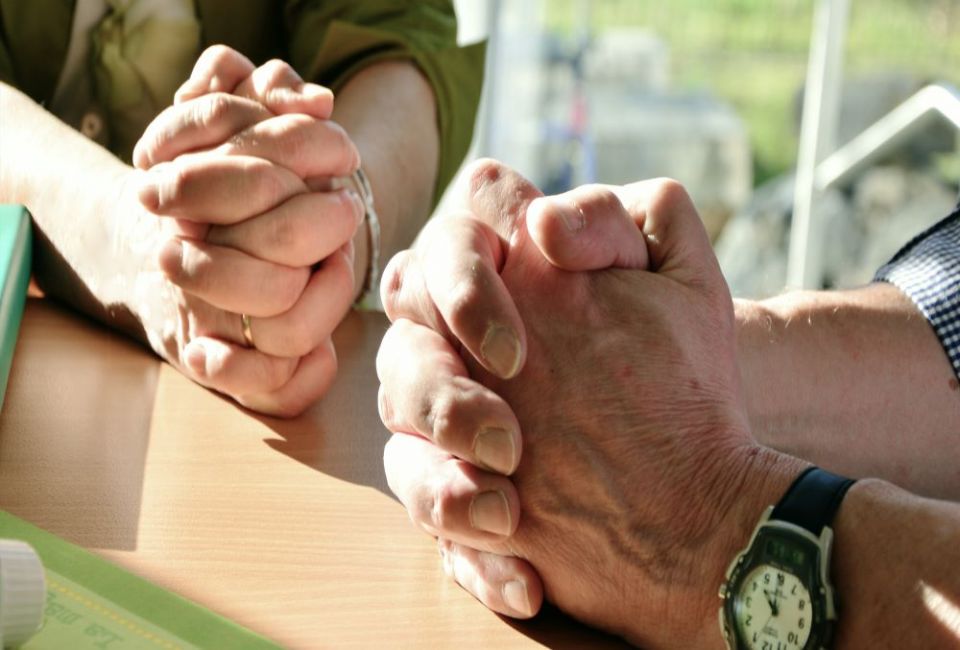Sister, will you pray for me? I hate that request. I don't believe "Sister" or "Father" have any direct line to God. In the United States that's theology from before my time. More often than not I'm not all that confident in my own ability to pray, so having someone ask me to pray for them seems extra hard. Yet I've been on the receiving end of the request more and more.
There is a group that sits near each other for Sunday Mass; some know each other by name, others only by sight. We kind of check in with each other before or after Mass, especially if someone is missing for more than one week. I settled in for Mass and was soon joined by the young mother who sits near me, and she leaned over and asked for prayers. Our eyes met and I could see real pain. As she got baby Kit settled, I gently asked what was happening. She shared that her hometown pastor had been arrested, charged with sexual abuse. She had been the chairperson of the parish council and he was to have presided at her wedding when he took an unplanned leave a few years ago.
His guilt or innocence didn't matter to her. She was feeling betrayed by the institution she was very much committed to and in love with. She was hurt and angry and by her own admission didn't know what to do other than ask "the sister" who sits next to her to pray because she couldn't. I remember nothing about that Mass other than sitting close to a young mom and baby, being angry about a situation I was not a part of and trying to fulfil her request that I pray for her.
A few months passed and a school colleague was hospitalized. Doctors were not sure what was wrong, but she was very ill. As the campus minister at the time, I received a phone call from her family: Could I find a priest and have him come anoint her? We don't have a priest chaplain on staff, so I made a few calls and a priest from my parish agreed if I went with him. My colleague was allowed only one visitor at a time, but Father and I were escorted in while her parents were escorted out.
Advertisement
Advertisement
While Father started the anointing prayers and rituals, I focused on trying to keep her calm; I wasn't really paying attention to the prayers. A gentle kick under her bed let me know I needed to respond because my colleague couldn't. Then Father asked me to share some thoughts from the scripture he had read and then say a final prayer. I'm sure he saw the panic on my face. I have no idea what I said, but I felt my colleague relax. As we left her room to meet with her parents, Father thanked me for my words.
We found out later she was septic and not expected to live. Every system in her body was shutting down. I am happy to share she is still very much alive. She has nearly complete recall of that prayer experience and often shares how much comfort both the anointing and my words brought her and her parents. As hard as I try, I can't remember much other than being there.
Several months later a former student contacted me. For 10 years I taught a foundational level theology course for students from China. They proudly declared themselves Communist Atheists and tolerated theology instruction because it was part of the agreement for attending our school. Students regularly commented "Catholic (sic) like old Chinese, stupid." Once they completed my class, I rarely saw them again. Yet an urgent message came from YAN ShuMing.
His grandmother had died; she was Catholic and while he made it clear that he and the rest of the family did not share her beliefs or a belief in any higher power, he wanted to honor her beliefs. The demand came: "Sister pray Catholic for my grandmother now." ShuMing and his family were in China and he was taking his turn at the 24-hour vigil with the body as part of the cultural rituals. Not sure how his family would react, he wanted someone to pray while no one was there except his deceased grandmother.
I found a staff member with the needed international phone app and off to the school chapel we went. With no preparation, I grabbed something that looked like a prayer book to hold and I prayed in six 45-second segments for a woman I never knew on the other side of the world. The video segments were sent immediately. A few hours later a tearful and heartfelt thank you came back: "Sister, my family thanks you for Catholic prayer."
I could cite many more examples of being asked to pray for or with someone: My Muslim friend who died after a terrible fall, a student shot to death in a road rage incident, a young family moving across the country for new employment opportunities, the pastor being reassigned — and the list continues to grow.
I couldn't help but wonder what was going on. Why did being asked to pray make me so uneasy? A friend suggested people asking me to pray for or with them shows their trust in me. I started to think about when I ask people to pray for me, and my friend was 100% right. I reach out to those I trust when I know I need help. I find great comfort in having someone hold me in prayer when I feel unable to pray myself. What I was being asked to do is return the favor. That made sense; that I could do.
“Sister, will you pray for me?” will probably always give me pause. The Spirit is with me. I’ll let her take the lead as I promise prayers for those who ask me.
Like what you're reading? Sign up for GSR e-newsletters!



